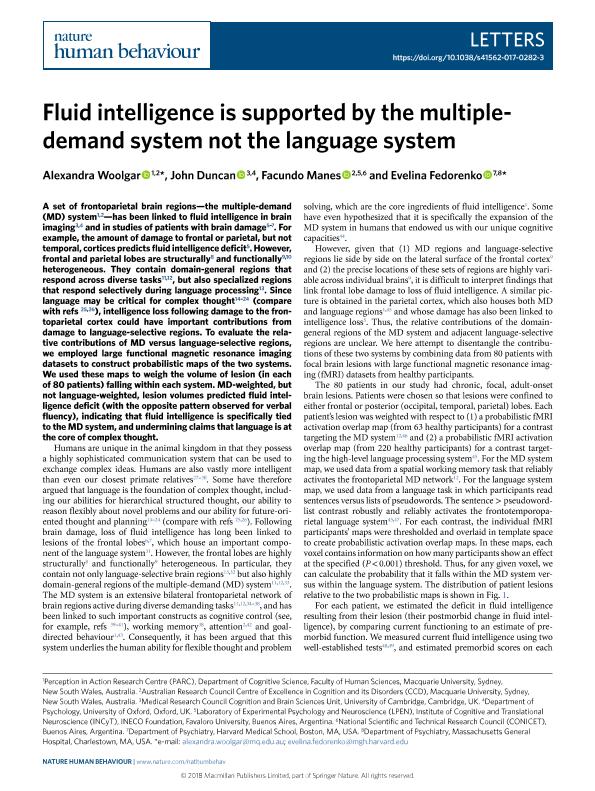Mostrar el registro sencillo del ítem
dc.contributor.author
Woolgar, Alexandra
dc.contributor.author
Duncan, John
dc.contributor.author
Manes, Facundo Francisco

dc.contributor.author
Fedorenko, Evelina
dc.date.available
2020-03-12T20:22:03Z
dc.date.issued
2018-03
dc.identifier.citation
Woolgar, Alexandra; Duncan, John; Manes, Facundo Francisco; Fedorenko, Evelina; Fluid intelligence is supported by the multiple-demand system not the language system; Nature Publishing Group; Nature Human Behaviour; 2; 3; 3-2018; 200-204
dc.identifier.issn
2397-3374
dc.identifier.uri
http://hdl.handle.net/11336/99374
dc.description.abstract
A set of frontoparietal brain regions-the multiple-demand (MD) system 1,2-has been linked to fluid intelligence in brain imaging 3,4 and in studies of patients with brain damage 5-7 . For example, the amount of damage to frontal or parietal, but not temporal, cortices predicts fluid intelligence deficit 5 . However, frontal and parietal lobes are structurally 8 and functionally 9,10 heterogeneous. They contain domain-general regions that respond across diverse tasks 11,12, but also specialized regions that respond selectively during language processing 13 . Since language may be critical for complex thought 14-24 (compare with refs 25,26 ), intelligence loss following damage to the frontoparietal cortex could have important contributions from damage to language-selective regions. To evaluate the relative contributions of MD versus language-selective regions, we employed large functional magnetic resonance imaging datasets to construct probabilistic maps of the two systems. We used these maps to weigh the volume of lesion (in each of 80 patients) falling within each system. MD-weighted, but not language-weighted, lesion volumes predicted fluid intelligence deficit (with the opposite pattern observed for verbal fluency), indicating that fluid intelligence is specifically tied to the MD system, and undermining claims that language is at the core of complex thought.
dc.format
application/pdf
dc.language.iso
eng
dc.publisher
Nature Publishing Group

dc.rights
info:eu-repo/semantics/openAccess
dc.rights.uri
https://creativecommons.org/licenses/by-nc-sa/2.5/ar/
dc.subject
FLUID INTELLIGENCE
dc.subject
MULTIPLE DEMAND SYSTEM
dc.subject.classification
Neurociencias

dc.subject.classification
Medicina Básica

dc.subject.classification
CIENCIAS MÉDICAS Y DE LA SALUD

dc.title
Fluid intelligence is supported by the multiple-demand system not the language system
dc.type
info:eu-repo/semantics/article
dc.type
info:ar-repo/semantics/artículo
dc.type
info:eu-repo/semantics/publishedVersion
dc.date.updated
2020-03-10T12:27:17Z
dc.journal.volume
2
dc.journal.number
3
dc.journal.pagination
200-204
dc.journal.pais
Estados Unidos

dc.description.fil
Fil: Woolgar, Alexandra. Macquarie University; Australia
dc.description.fil
Fil: Duncan, John. University of Oxford; Reino Unido. University of Cambridge; Estados Unidos
dc.description.fil
Fil: Manes, Facundo Francisco. Macquarie University; Australia. Universidad Favaloro; Argentina. Consejo Nacional de Investigaciones Científicas y Técnicas. Oficina de Coordinación Administrativa Houssay. Instituto de Neurociencia Cognitiva y Traslacional. Fundación Ineco Rosario Sede del Incyt | Instituto de Neurología Cognitiva. Instituto de Neurociencia Cognitiva y Traslacional. Fundación Ineco Rosario Sede del Incyt | Fundación Favaloro. Instituto de Neurociencia Cognitiva y Traslacional. Fundación Ineco Rosario Sede del Incyt; Argentina
dc.description.fil
Fil: Fedorenko, Evelina. Harvard Medical School; Estados Unidos. Massachusetts General Hospital; Estados Unidos
dc.journal.title
Nature Human Behaviour
dc.relation.alternativeid
info:eu-repo/semantics/altIdentifier/doi/http://dx.doi.org/10.1038/s41562-017-0282-3
dc.relation.alternativeid
info:eu-repo/semantics/altIdentifier/url/https://www.nature.com/articles/s41562-017-0282-3
Archivos asociados
